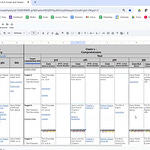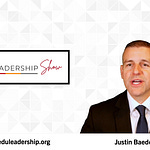Stopping the Pendulum: Making Education a Research-Based Profession: What Real Professions Get Right—and Education Doesn’t (2025) by Douglas Carnine (apologies for mispronouncing this as “Carmine” in the show) on The Next 30 Years by Robert Pondiscio
Why Education Experts Resist Effective Practices by Douglas Carnine (2000) (PDF)
Schools Are Accommodating Student Anxiety — and Making It Worse, by Ben Lovett and Alex Jordan (originally published behind a paywall in the Boston Globe)
Accommodations for anxiety are often counterproductive. Justin Baeder @eduleadership on TikTok
Corn in the Horn—Bryan Akers on Facebook (read the comments for more stories of odd objects found inside band instruments)
Full Transcript:
(00:01):
Welcome to the Eduleadership Show. I’m your host, Justin Baeder, and in this episode we’ll talk about stopping the pendulum swings and making the education profession one that’s based on evidence. We will talk about why some accommodations for anxiety may be counterproductive and ultimately not helpful for students. And we’ll talk about the band director who found corn in the horn. Let’s get to it.
(00:40):
First up, Douglas Carnine, the Professor emeritus of the University of Oregon and founder of the National Center to Improve the Tools of Educators, has a new article out published by Robert Pondiscio over at The Next 30 years. And in this article, he argues strongly that we do not have a research based profession, that education is not a profession that takes research seriously. And he outlines a plan for turning it into one and making this a profession where we make decisions based on evidence and we don’t revert to discredited practices.
(01:16):
Now, you may recognize Douglas Carnine’s name from a paper he wrote about 25 years ago called Why Education Experts Resist Effective Practices and What It Would Take to Make Education More Like Medicine. And in his new article, he picks up on that argument, which has a lot of updates. We’ve had a lot happen in the last 25 years, and he argues that we’ve essentially kept doing the same thing. We have allowed the profession to swing back and forth between different priorities that are not driven by research. He says, professions grounded in evidence don’t revert to disproven practices, but education does—it lurches on a pendulum swinging back and forth between approaches already tested and found wanting.
(01:57):
And he says, if we want to be an evidence-based profession, we need five basic things. And those five things are a shared knowledge base, research aligned educator preparation for teachers and administrators, licensure that is rooted in competence.
(02:12):
In other words, we should actually have to demonstrate that we are able to teach or able to lead before getting licensed accreditation with teeth. In other words, certification programs should be held accountable through the accreditation process if they’re not teaching what they need to teach and preparing graduates the way they need to. And then fifth, accountability for quality of practice.
(02:31):
And he says other fields have all of those characteristics. They meet all of those criteria. Medicine, aviation, there are lots of industries, lots of professions that meet those criteria and yet we don’t. So what should we do about it? Carnine suggests putting in place three particular guardrails. First, a shared knowledge base where we can agree this is what the research says, this is what the research says we should do and what we shouldn’t do. And that has been a challenge in our profession.
(02:58):
We are continuing to battle discredited disproven practices that we know are not a good idea. They live on far longer than they should. Second, he says, we need implementation tools to support educators with effective practices. And then finally he says, we need a consortium of states and districts. So check out that article over at the next 30 years. We’ll put a link in the show notes as always, and lemme know what you think of this argument and this approach. I think curriculum is kind of the missing ingredient here. I think it’s great when we can agree on what the research says. We have not shown that as a profession, we do a great job of agreeing on what the research says and then acting on it. But I think curriculum is a promising way around that limitation in our profession if we have a vulnerability around how well we do with research, well curriculum can be designed based on quality research and then that curriculum can be implemented even if not everybody who’s implementing the curriculum is aware of the research.
(03:54):
So I think there’s an overlooked vehicle here in curriculum, but let me know what you think. Next up, are schools making student anxiety worse by providing unnecessary accommodations? Let’s take a look. Schools are accommodating student anxiety and making it worse. According to a new article by Alex Jordan and Ben Levitt who are psychologists writing for Teachers College at Columbia University. And this is not an outlet that I would expect to say something like this, but I’m glad that they’re saying it because if we at school help kids with anxiety, avoid the things they’re anxious about, what’s that going to do to their anxiety? Well, they explained quite clearly that is going to increase their anxiety. It is going to reinforce the false idea that the thing they’re anxious about is actually dangerous. Like if you have anxiety about public speaking, well, public speaking is not actually harmful.
(04:46):
It’s not actually dangerous. And you are accommodated in that anxiety by getting out of public speaking, getting out of reading in front of the class. If you’re anxious about timed tests and you’re given an accommodation that says, well, you don’t have to take timed tests, you have as much time as you need, that is going to harm you as a student and reinforce the idea that you can’t do it, that you don’t have what it takes, that the situation is just unmanageable. And I think what we’ve got to remind students and reinforce for students whether they have anxiety or not, and what we’ve got to remind ourselves of is that students are capable. Students do rise to challenges and students need to be challenged in order to get an education. So check this article out. I’ll put the link in the comments. Schools are accommodating student anxiety and making it worse.
(05:30):
And they point out that the average student with anxiety gets 20 accommodations in school, many of which are avoidance based. You don’t have to do it. You don’t have a time limit. You can do it privately. You have an alternate format. If the thing that we’re asking kids to do is good for them, we should not let them out of it. In the name of kindness, let me know what you think. I think a good framework for thinking about accommodations is to think about a physical accommodation, right? If you have a student who has a broken leg or perhaps a degenerative disease and is not able to use stairs, well of course you’re going to allow that student to use the elevator. No question. They’re entitled to that accommodation. But think about a student who does not have a broken leg, does not have any kind of medical condition that makes it impossible for them to walk upstairs.
(06:18):
They just don’t feel like it. Well, if we suddenly start accommodating that and treating it as if it’s a much more severe condition than it is, well, what we’re going to see over time is that students become less and less able to walk up and down the stairs and more dependent on the elevator when they don’t need to be right. We risk making students get into worse shape, whether it’s academically or physically when we provide accommodations that they don’t need. And I think we can take the real situation seriously. We can treat it seriously as a medical condition and certainly anxiety can be a very serious condition that deserves professional treatment. But that doesn’t mean that we treat all discomfort or all requests from students and families as if they are serious medical issues. And there was one particular comment, student who’s an adult now and is commenting but had severe anxiety as a kid and got treated at a children’s hospital, would shut down during tests.
(07:15):
And I thought this was the kind of situation that was worth accommodating, right? Where it’s actually serious and it is necessary for the student to benefit from their education. What I think the authors of the article that I just shared are calling for is for as to not provide unnecessary accommodations for students who don’t really need them and to not reinforce anxiety over little things that kids can get used to and do absolutely fine with taking tests or speaking in classes. But we’ve had over half a million views on social media for that video so far, and thousands of comments. So let me know what you think.
(07:53):
Lastly, I came across this post from Bryan Akers, who is band and choir director at Hanover-Horton High School, who was working with some of his middle school students. And he said, I don’t have many firsts anymore, but this was a first.
(08:06):
He had a student whose horn didn’t sound right, it was not working, so he looked inside of it. And what did he find? Corn? He found corn in the horn and some of it was even sprouting. And Bryan concludes. So that’s middle school on a Wednesday for you. If you have a fun story to share from your experience or that you found on social media, please send it my way and we might feature it in an upcoming episode of the Eduleadership Show.
(08:33):
Lastly, I also wanted to let you know that I’m launching a new show called The Teaching Show. You can subscribe right here on substack or go to TeachingShow.com. And what’s different about the teaching show is that I’m focusing on very specific practices. Each episode will be a deep dive on one particular practice with one particular person. And so far I have one episode published with Marcie Samayoa focusing on FASE reading and tiered vocabulary instruction in science.
(09:03):
So check that out and let me know if you would like to be a guest or if you have a guest recommendation for an upcoming episode. But our goal is to focus on practice, to get specific, to talk about those areas of practice that often get overlooked.
(09:15):
So if like Bryan, you are a band director, if you are a choir director, if you are teaching art or an elective class, if you are engaged in pedagogy, that often gets overlooked. I want to talk with you about how you teach. So reach out anytime and go to teaching show.com to subscribe. That’s it for this episode of The Eduleadership Show. I’m Justin Baeder, and I’ll see you next time.










